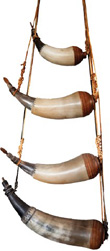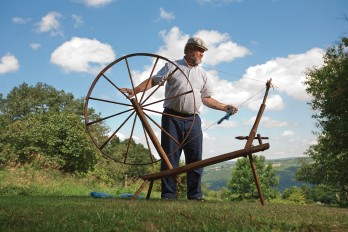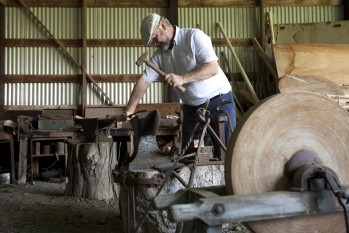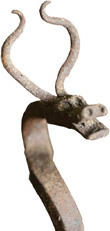CORNELL PEOPLE

Some of Wayne Harbert's hand-crafted powder horns. See larger image
Linguist Harbert appears to have a trapdoor to Tolkien's Middle Earth
Not many linguists go hunting with flintlock rifle and powder horn or know how to weave a throw rug. Fewer still can translate Old English kennings about swords from first-hand experience with blacksmithing.
In the 32 years he has been at Cornell, Wayne Harbert, professor of linguistics and director of undergraduate studies for the department, has published numerous works on Germanic and Celtic languages, as well as articles on Arabic and Arawak. He has also learned to repair fiddles and make hunting bows.
"What brought me to linguistics – and really the only connection between my profession and my hobbies – is an obsession with old, useless things," says Harbert, who received his Ph.D. in Germanic studies in 1978 from the University of Illinois.
Harbert's enthusiasm for his hobbies spills over as he displays his work: a forged metal spoon with a dramatically twisted handle; hand-crafted powder horns in two-color horn and polished wood; finely edged arrowheads made by flint knapping. Bunches of wool become thread as he demonstrates the hand-spindle he's made, pointing out that it's "perhaps the most universal of all inventions, being found in Neolithic excavations everywhere."

Wayne Harbert, professor of linguistics, demonstrates his spinning wheel. See larger image
In defense of his hobbies, Harbert says, "The more things you are involved in intellectually, the less precarious your sense of success. If I teach a class I'm not happy with or get a bad review for an article I've written, I have all these other things I can retreat to. I'm not so invested in my profession that my whole sense of self resides in it."
Yet Harbert climbs up and down on a chair to fetch samples of his academic writing with the same enthusiasm he shows for his hobbies.
And he talks about language extinction with equal fervor. "You can't work with Celtic languages for long without coming to the realization that these languages are in deadly peril," he says. In 2005 Harbert organized a conference, "Language and Poverty," which brought together scholars from different disciplines studying minority language extinction and the relationship between language and economics. "These issues are not problems for which one discipline has all the answers," explains Harbert.

Professor Wayne Harbert works near his forge at home. See larger image
Though Harbert insists that his hobbies and his academic world are distinct, examples abound of their interconnections. At the recent Ithaca Scottish Games and Celtic Festival, Harbert demonstrated his spinning wheel – while passing out what he calls "Gaelic propaganda," cards listing basic Gaelic phrases.
And Harbert published a challenge to a translation of a term in the medieval German poem "Parzival" based on his knowledge of blacksmithing; he won a Welsh bard contest using "cynghanedd," the distinctive sound patterns of Welsh strict meter poetry; and as an active member of the Black Sheep Handspinners Guild, he has written about Gaulish inscriptions on spindle whorls. (These spindles were given by boys to their sweethearts, and bear messages such as "pretty girl, give me beer!")

One of the dramatically twisted creations Wayne Harbert crafts in his forge. See larger image
Harbert describes his class on the history of the English language as a celebration of language as a whole, including the culture in which it's embedded. He encourages students to go far afield with their final projects and indulge the kind of insatiable curiosity Harbert himself demonstrates. He says the students are ingenious at coming up with topics, such as a translation of Lewis Carroll's "Jabberwocky" into Old English.
With medieval studies graduate student Aaron Ralby '10, Harbert recently experimented with building a medieval Scandinavian warp-weighted loom. Their authentic approach extended to using the loom in subfreezing temperature, as the Vikings would have done when weaving sails worth more than the ships themselves.
"I'm interested in primitive technologies of all sorts," says Harbert, who also has his own forge and grows his own dye plants.